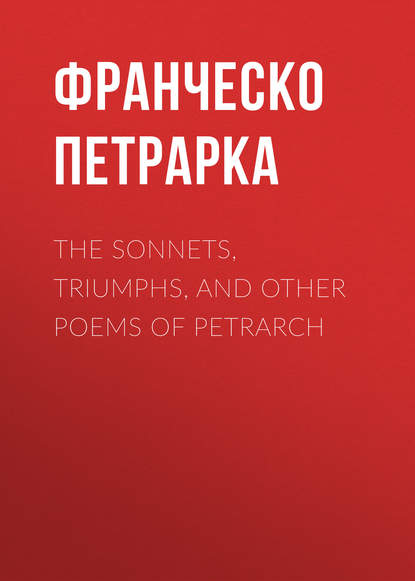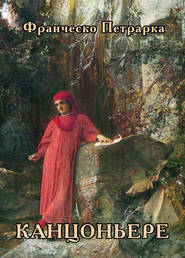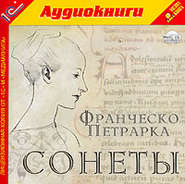По всем вопросам обращайтесь на: info@litportal.ru
(©) 2003-2025.
✖
The Sonnets, Triumphs, and Other Poems of Petrarch
Настройки чтения
Размер шрифта
Высота строк
Поля
Upon the breeze, or in a single mind,
Where have so many virtues ever met,
E'en though those charms have slain my bosom's weal?
He knows not love who has not seen her eyes
Turn when she sweetly speaks, or smiles, or sighs,
Or how the power of love can hurt or heal.
Sonnet lxix. is remarkable for the fineness of its closing thought.
Time was her tresses by the breathing air
Were wreathed to many a ringlet golden bright,
Time was her eyes diffused unmeasured light,
Though now their lovely beams are waxing rare,
Her face methought that in its blushes show'd
Compassion, her angelic shape and walk,
Her voice that seem'd with Heaven's own speech to talk;
At these, what wonder that my bosom glow'd!
A living sun she seem'd—a spirit of heaven.
Those charms decline: but does my passion? No!
I love not less—the slackening of the bow
Assuages not the wound its shaft has given.
The following sonnet is remarkable for its last four lines having puzzled all the poet's commentators to explain what he meant by the words "Al man ond' io scrivo è fatta arnica, a questo volta." I agree with De Sade in conjecturing that Laura in receiving some of his verses had touched the hand that presented them, in token of her gratitude.[15 - Cercato ho sempre solitaria vita.—Sonnet 221, De Sade, vol. ii. p. 8.]
In solitudes I've ever loved to abide
By woods and streams, and shunn'd the evil-hearted,
Who from the path of heaven are foully parted;
Sweet Tuscany has been to me denied,
Whose sunny realms I would have gladly haunted,
Yet still the Sorgue his beauteous hills among
Has lent auxiliar murmurs to my song,
And echoed to the plaints my love has chanted.
Here triumph'd, too, the poet's hand that wrote
These lines—the power of love has witness'd this.
Delicious victory! I know my bliss,
She knows it too—the saint on whom I dote.
Of Petrarch's poetry that is not amatory, Ugo Foscolo says with justice, that his three political canzoni, exquisite as they are in versification and style, do not breathe that enthusiasm which opened to Pindar's grasp all the wealth of imagination, all the treasures of historic lore and moral truth, to illustrate and dignify his strain. Yet the vigour, the arrangement, and the perspicuity of the ideas in these canzoni of Petrarch, the tone of conviction and melancholy in which the patriot upbraids and mourns over his country, strike the heart with such force, as to atone for the absence of grand and exuberant imagery, and of the irresistible impetus which peculiarly belongs to the ode.
Petrarch's principal Italian poem that is not thrown into the shape of the sonnet is his Trionfi, or Triumphs, in five parts. Though not consisting of sonnets, however, it has the same amatory and constant allusions to Laura as the greater part of his poetry. Here, as elsewhere, he recurs from time to time to the history of his passion, its rise, its progress, and its end. For this purpose, he describes human life in its successive stages, omitting no opportunity of introducing his mistress and himself.
1. Man in his youthful state is the slave of love. 2. As he advances in age, he feels the inconveniences of his amatory propensities, and endeavours to conquer them by chastity. 3. Amidst the victory which he obtains over himself, Death steps in, and levels alike the victor and the vanquished. 4. But Fame arrives after death, and makes man as it were live again after death, and survive it for ages by his fame. 5. But man even by fame cannot live for ever, if God has not granted him a happy existence throughout eternity. Thus Love triumphs over Man; Chastity triumphs over Love; Death triumphs over both; Fame triumphs over Death; Time triumphs over Fame; and Eternity triumphs over Time.
The subordinate parts and imagery of the Trionfi have a beauty rather arabesque than classical, and resembling the florid tracery of the later oriental Gothic architecture. But the whole effect of the poem is pleasing, from the general grandeur of its design.
In summing up Petrarch's character, moral, political, and poetical, I should not stint myself to the equivocal phrase used by Tacitus respecting Agricola: Bonum virum facile dixeris, magnum libenter, but should at once claim for his memory the title both of great and good. A restorer of ancient learning, a rescuer of its treasures from oblivion, a despiser of many contemporary superstitions, a man, who, though no reformer himself, certainly contributed to the Reformation, an Italian patriot who was above provincial partialities, a poet who still lives in the hearts of his country, and who is shielded from oblivion by more generations than there were hides in the sevenfold shield of Ajax—if this was not a great man, many who are so called must bear the title unworthily. He was a faithful friend, and a devoted lover, and appears to have been one of the most fascinating beings that ever existed. Even when his failings were admitted, it must still be said that even his failings leaned to virtue's side, and, altogether we may pronounce that
His life was gentle, and the elements
So mix'd in him that Nature might stand up
And say to all the world, "This was a man!"
PETRARCH'S SONNETS,
ETC
TO LAURA IN LIFE
SONNET I
Voi, ch' ascoltate in rime sparse il suono
HE CONFESSES THE VANITY OF HIS PASSION
Ye who in rhymes dispersed the echoes hear
Of those sad sighs with which my heart I fed
When early youth my mazy wanderings led,
Fondly diverse from what I now appear,
Fluttering 'twixt frantic hope and frantic fear,
From those by whom my various style is read,
I hope, if e'er their hearts for love have bled,
Not only pardon, but perhaps a tear.
But now I clearly see that of mankind
Long time I was the tale: whence bitter thought
And self-reproach with frequent blushes teem;
While of my frenzy, shame the fruit I find,
And sad repentance, and the proof, dear-bought,
That the world's joy is but a flitting dream.
Charlemont.
O ye, who list in scatter'd verse the sound
Of all those sighs with which my heart I fed,
When I, by youthful error first misled,
Unlike my present self in heart was found;
Who list the plaints, the reasonings that abound
Throughout my song, by hopes, and vain griefs bred;
If e'er true love its influence o'er ye shed,
Oh! let your pity be with pardon crown'd.
But now full well I see how to the crowd
For length of time I proved a public jest:
E'en by myself my folly is allow'd:
And of my vanity the fruit is shame,
Repentance, and a knowledge strong imprest,
That worldly pleasure is a passing dream.
Nott.
Ye, who may listen to each idle strain
Bearing those sighs, on which my heart was fed
In life's first morn, by youthful error led,
Where have so many virtues ever met,
E'en though those charms have slain my bosom's weal?
He knows not love who has not seen her eyes
Turn when she sweetly speaks, or smiles, or sighs,
Or how the power of love can hurt or heal.
Sonnet lxix. is remarkable for the fineness of its closing thought.
Time was her tresses by the breathing air
Were wreathed to many a ringlet golden bright,
Time was her eyes diffused unmeasured light,
Though now their lovely beams are waxing rare,
Her face methought that in its blushes show'd
Compassion, her angelic shape and walk,
Her voice that seem'd with Heaven's own speech to talk;
At these, what wonder that my bosom glow'd!
A living sun she seem'd—a spirit of heaven.
Those charms decline: but does my passion? No!
I love not less—the slackening of the bow
Assuages not the wound its shaft has given.
The following sonnet is remarkable for its last four lines having puzzled all the poet's commentators to explain what he meant by the words "Al man ond' io scrivo è fatta arnica, a questo volta." I agree with De Sade in conjecturing that Laura in receiving some of his verses had touched the hand that presented them, in token of her gratitude.[15 - Cercato ho sempre solitaria vita.—Sonnet 221, De Sade, vol. ii. p. 8.]
In solitudes I've ever loved to abide
By woods and streams, and shunn'd the evil-hearted,
Who from the path of heaven are foully parted;
Sweet Tuscany has been to me denied,
Whose sunny realms I would have gladly haunted,
Yet still the Sorgue his beauteous hills among
Has lent auxiliar murmurs to my song,
And echoed to the plaints my love has chanted.
Here triumph'd, too, the poet's hand that wrote
These lines—the power of love has witness'd this.
Delicious victory! I know my bliss,
She knows it too—the saint on whom I dote.
Of Petrarch's poetry that is not amatory, Ugo Foscolo says with justice, that his three political canzoni, exquisite as they are in versification and style, do not breathe that enthusiasm which opened to Pindar's grasp all the wealth of imagination, all the treasures of historic lore and moral truth, to illustrate and dignify his strain. Yet the vigour, the arrangement, and the perspicuity of the ideas in these canzoni of Petrarch, the tone of conviction and melancholy in which the patriot upbraids and mourns over his country, strike the heart with such force, as to atone for the absence of grand and exuberant imagery, and of the irresistible impetus which peculiarly belongs to the ode.
Petrarch's principal Italian poem that is not thrown into the shape of the sonnet is his Trionfi, or Triumphs, in five parts. Though not consisting of sonnets, however, it has the same amatory and constant allusions to Laura as the greater part of his poetry. Here, as elsewhere, he recurs from time to time to the history of his passion, its rise, its progress, and its end. For this purpose, he describes human life in its successive stages, omitting no opportunity of introducing his mistress and himself.
1. Man in his youthful state is the slave of love. 2. As he advances in age, he feels the inconveniences of his amatory propensities, and endeavours to conquer them by chastity. 3. Amidst the victory which he obtains over himself, Death steps in, and levels alike the victor and the vanquished. 4. But Fame arrives after death, and makes man as it were live again after death, and survive it for ages by his fame. 5. But man even by fame cannot live for ever, if God has not granted him a happy existence throughout eternity. Thus Love triumphs over Man; Chastity triumphs over Love; Death triumphs over both; Fame triumphs over Death; Time triumphs over Fame; and Eternity triumphs over Time.
The subordinate parts and imagery of the Trionfi have a beauty rather arabesque than classical, and resembling the florid tracery of the later oriental Gothic architecture. But the whole effect of the poem is pleasing, from the general grandeur of its design.
In summing up Petrarch's character, moral, political, and poetical, I should not stint myself to the equivocal phrase used by Tacitus respecting Agricola: Bonum virum facile dixeris, magnum libenter, but should at once claim for his memory the title both of great and good. A restorer of ancient learning, a rescuer of its treasures from oblivion, a despiser of many contemporary superstitions, a man, who, though no reformer himself, certainly contributed to the Reformation, an Italian patriot who was above provincial partialities, a poet who still lives in the hearts of his country, and who is shielded from oblivion by more generations than there were hides in the sevenfold shield of Ajax—if this was not a great man, many who are so called must bear the title unworthily. He was a faithful friend, and a devoted lover, and appears to have been one of the most fascinating beings that ever existed. Even when his failings were admitted, it must still be said that even his failings leaned to virtue's side, and, altogether we may pronounce that
His life was gentle, and the elements
So mix'd in him that Nature might stand up
And say to all the world, "This was a man!"
PETRARCH'S SONNETS,
ETC
TO LAURA IN LIFE
SONNET I
Voi, ch' ascoltate in rime sparse il suono
HE CONFESSES THE VANITY OF HIS PASSION
Ye who in rhymes dispersed the echoes hear
Of those sad sighs with which my heart I fed
When early youth my mazy wanderings led,
Fondly diverse from what I now appear,
Fluttering 'twixt frantic hope and frantic fear,
From those by whom my various style is read,
I hope, if e'er their hearts for love have bled,
Not only pardon, but perhaps a tear.
But now I clearly see that of mankind
Long time I was the tale: whence bitter thought
And self-reproach with frequent blushes teem;
While of my frenzy, shame the fruit I find,
And sad repentance, and the proof, dear-bought,
That the world's joy is but a flitting dream.
Charlemont.
O ye, who list in scatter'd verse the sound
Of all those sighs with which my heart I fed,
When I, by youthful error first misled,
Unlike my present self in heart was found;
Who list the plaints, the reasonings that abound
Throughout my song, by hopes, and vain griefs bred;
If e'er true love its influence o'er ye shed,
Oh! let your pity be with pardon crown'd.
But now full well I see how to the crowd
For length of time I proved a public jest:
E'en by myself my folly is allow'd:
And of my vanity the fruit is shame,
Repentance, and a knowledge strong imprest,
That worldly pleasure is a passing dream.
Nott.
Ye, who may listen to each idle strain
Bearing those sighs, on which my heart was fed
In life's first morn, by youthful error led,














